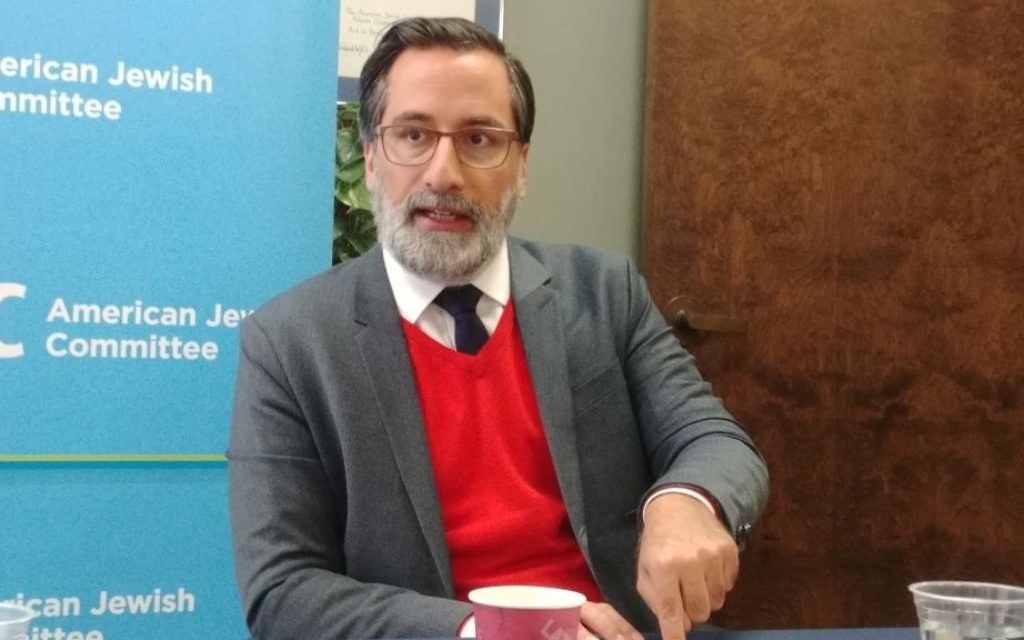Europe Struggles to Accept Islam
European attitudes toward Islam are much different than they were before the turn of the century.

European attitudes toward Islam have shifted since 9/11 regarding the religion’s compatibility with democracy, its future in Europe and the refugee crisis.
Islam in Europe was discussed in great detail at the American Jewish Committee university luncheon with the American Council on Germany on Monday, Dec. 11.
Speaker Alexander Görlach expanded on the subject from a German context. He is a senior fellow at the Carnegie Council for Ethics in International Affairs and holds a doctorate in comparative religion from Ludwig-Maximilians-Universität in Munich.
Get The AJT Newsletter by email and never miss our top stories Free Sign Up
Görlach said that the discussion regarding Islam has changed the past two years and that negative attitudes about the religion have spread to central European countries such as Poland, Hungary and Slovenia.
“The approval rate … and survey results regarding whether people want a Muslim as their neighbor has plummeted in a sense,” he said. The focus has been on people from Turkey, long a candidate for full membership in the European Union.
Varying European constitutions and their mentions of G-d affect Islam’s integration.
“There are different traditions regarding how European nations publicly and politically deem religion, whether to invoke G-d and which G-d that would be, and although propositions have alluded to a Judeo-Christian G-d, this has inevitably left Islam out,” Görlach said.
To resolve that problem, some Europeans sought to highlight the religious heritage of European countries, but that approach again excluded Islam, Görlach said. “It’s highly debatable to what degree Islam played a role in European history, but in terms of policymaking nowadays, the term Judeo-Christian is very often used to clearly indicate that it’s all but Muslim.”
Görlach said the quest for a European identity influences views on Islam and on immigration and affects what people face when they move to another country. Problems arise in the public sphere and civil society. “It’s clear to my understanding that Europe has a Christian past. It also has a Christian present, but … what makes us so Christian? A majority of the Christians today live in the Americas, and a majority of Muslims on the other hand do not live in Arab countries.”
He said it may be historical to refer to Europe as Christian, “but what do we make out of it in the future is highly debatable.”
The relationship between politics and religion is particularly significant for Islam in Germany, Görlach said. “If you get the state’s recognition as a religious community, you have the possibility to send clergy into the military, into hospitals, and the right to fund your own schools. … These privileges are asserted to several religious communities in Germany — the Protestants, the Catholics and the Jewish community — but not to Muslims.”
German law reflects a Christian context, so what you need for recognition as a religious community is a list of members, a set of beliefs and guaranteed sustainability in the sense that religion will not go away in a year, Görlach said. “Islam does not know the central hierarchy as the Catholic Church does, so that prevented, in the German framework and on the federal and state level, to make Islam a fully integrated religion by law.”
Görlach said European attitudes toward Islam also shifted in 2015 after German Chancellor Angela Merkel began philosophizing about borders in the 21st century and agreed to accept 1 million Syrian refugees.
“This was a game-changer … and also sparked the alt-right movement in Germany,” he said. “This also devastated the conservative camp and … helped the right-wing party regain a certain influence.”
A rash of New Year’s Eve sexual assaults blamed on immigrants in Cologne did nothing to make the debate on Islam go away.
“To relentlessly speak of Islam as one entity is not helpful when you try to raise real questions or try to integrate a group from another culture or religious background as part of your society,” Görlach said. “For the largest part, European countries such as Spain, Greece and Portugal had to learn the hard way what democracy was. … The framework helped change their scope and rhetoric. … Why would we deny this capability to the religion of Islam? … I think that’s one of the big challenges for the future.”




comments